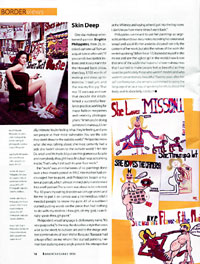Press for Birgitte Philippides
Skin Deep
BorderCrossings
Issue 90, May 2004
Twenty years after [Birgitte's] self-confrontation, she remains
committed to using the language of art as a way of speaking forcefully
about the body and its disorderly conduct. |

click image for larger version
|
| Here are excerpts from an interview, conducted by journalist Adele
Nieves of Liquid Words Productions, LLC, with Birgitte Philippides,
artist and activist, on January 31, 2007. The complete interview
will appear in the upcoming anthology What We Think: Thoughts on
Gender, Women’s Issues and Feminism in the 21st Century. |
|
AN: You speak of healing, dealing with bulimia for nine years and
now being healed. Can you explain how that healing process began, and
how it evolved?
BP: . . . I had a boyfriend about 14 years ago who was a fabulous, amazing
photographer. He started taking pictures of me. Luckily, they were really
good pictures, and people started approaching me and asking me to do
nudes for them. I felt this sense of . . . I just said fuck it. I am
tired of the crap in this world, constantly being barraged by the media
and everyone else that I’m not supposed to feel good about myself because
I’m larger. I’m sick of it, I don’t have time for it, and I’m going
to have my own little birthday party for myself, and celebrate myself.
So one of the ways I did that was posing nude.
. . . I continue to do that, and celebrate myself. It’s been a fabulous
journey, and I’ve spread it to a lot of my friends who have craved that
kind of self-expression for themselves. There’s something about being
in front of the camera; if you do it right, you’re celebrating yourself.
That was huge for me. When I was 212 pounds, I thought, honestly, that
I was fucking super hot. I felt really beautiful. Now, was I happy all
the time? No, and I’m happier now that I weigh less. I’d like to come
down a little more, for health reasons, for a lot of different reasons.
But I still feel great now. It’s not arrogance; the key is to feel good
about you at that weight. If you’re losing weight in order to feel good
about yourself losing the weight, you’re still going to feel lousy even
if you’re 70 pounds lighter. It’s about marching to your own drumbeat
instead of trying to be what everyone else tells you to be. Then you
truly are beautiful.
. . . I’m fascinated by beauty and at the same time repulsed at society’s
emphasis on it, and the pressure to be beautiful. It’s very sad; the
majority of women are not happy with the way they look or with themselves,
and I’m just pissed off about that, it’s such a tragedy. I spent the
first half of my life beating myself up, torturing myself, hating myself,
damaging my body and damaging myself. When I stopped, I said from now
on it’s all about celebrating myself, my life, my beauty. Concentrating
on what I have instead of what I don’t, and being positive for the rest
of my life. That’s it. I spent a lifetime in 24 years beating myself
up, and there ain’t no more time. I’ve used that time up, as far as
I’m concerned. I’ve had at least 15 people in my life die, and it completely
changed me because I realized that I don’t have the time for that kind
of thinking. It’s a bore, it’s a waste, and it’s very sad.
AN: How did you become involved in Polyamory?
With Polyamory, I went to one meeting, was interested, and kept on exploring
it, going to more meetings. I initially went as a follower, and quickly
realized there was no one to follow. Then I became the leader. I remember
thinking “I don’t even want to be a leader.” But I didn’t have a choice,
no one else was a leader, and everyone else was looking to me.
. . . I want to make a difference in the world. Things didn’t change
and improve in the world with people being silent. So you can sit there
and be quiet, and take crap from your boss, or you can make a difference
and help others. Speaking up and speaking out about what’s going on
can make a difference, not just in you but in other people. Being quiet
is the easy choice, but it’s not always the right choice.
AN: Art is such a powerful tool of communication; explain how art
helps you speak and communicate.
Even now, I still feel like a deaf mute. It’s hard for me to speak.
When I started painting 15 years ago, it was just this miracle. The
day that I started painting was the day that I stopped throwing up for
the first time in nine years. It was no accident, there was a direct
correlation. I’d had no voice. All this pain, all these things going
on with me, I couldn’t speak a lot of it. I was just going nuts. Once
I started painting, it was as if the scream erupted, and I was able
to communicate how I really felt. Before then, I just couldn’t. I was
a well-behaved child, a good girl, obedient, and everything else. So
I could never really tell my mom how I felt. But once I started painting,
I could tell her I was upset, how I was feeling. So there was a direct
correlation between my painting and my own healing, being able to express
myself and my own emotions.
|
